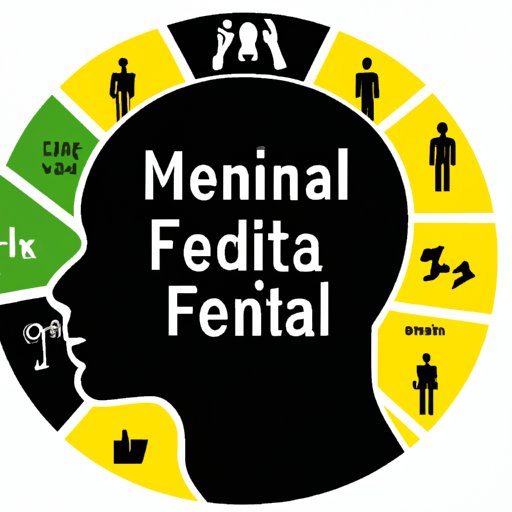
I. Introduction
Mental health issues have become a prevalent topic of conversation globally in recent years. The World Health Organization (WHO) estimates that one in four people in the world will be affected by mental or neurological disorders at some point in their lives. This article aims to discuss and explore the prevalence and significance of mental health issues worldwide.
II. Prevalence of Mental Health Issues
The statistics and data surrounding mental illness worldwide are staggering. According to the WHO, over 450 million people suffer from some form of mental illness or disorder globally. Depression, anxiety, and schizophrenia are among the leading causes of illness and disability worldwide. Mental health issues also have a significant effect on the economy, costing the world over $2.5 trillion annually.
It is worth noting that mental health issues do not discriminate; they affect people of all ages, genders, races, and socioeconomic classes. However, access to resources, information, and treatment often varies according to a person’s demographic and geographic context. In many low-income countries, the rate of treatment for mental health disorders is as low as 10%, which highlights the importance of addressing this aspect of healthcare worldwide.
III. Causes and Risk Factors
Mental health disorders can stem from various causes and risk factors such as genetic predisposition, environmental factors, and lifestyle issues. Studies have shown that many mental health conditions, such as anxiety, bipolar disorder, and schizophrenia, have genetic roots, which predispose individuals to higher chances of developing these conditions. Environmental factors such as trauma, neglect or abuse, and substance use can also contribute to the development of mental disorders.
Lifestyle factors, including poor sleep habits, excessive alcohol, and tobacco use, and lack of physical activity, can also increase the likelihood of developing mental health issues. Moreover, the fundamental nature of how these factors interact and affect a person’s mental health is complex and multi-layered.
IV. Types of Mental Health Issues
The most common mental health conditions worldwide include depression, anxiety disorders, bipolar disorder, and schizophrenia. Depression is the leading cause of disability worldwide, affecting over 264 million people globally. Anxiety disorders, which include generalized anxiety disorder, social anxiety disorder, and panic disorder, are prevalent, affecting over 284 million people globally. Bipolar disorder is another prevalent mental health condition characterized by severe mood swings, and it affects between 1% and 3% of the population worldwide. Schizophrenia is a severe mental disorder, affecting around 20 million people globally, with symptoms of hallucinations and delusions.
V. Treatment Options
The good news is that mental health disorders are treatable. Several treatment options are available, and finding the most suitable treatment depends on the individual’s specific needs and the nature of their mental health disorder. These treatments include medications, psychotherapy, cognitive-behavioral therapy, and support groups.
Recent advancements in technology and research have made significant contributions to mental healthcare. Teletherapy and telepsychiatry are becoming more popular, allowing individuals to access therapy and psychiatric support online, which increases access to mental health services and reduces the cost of treatment. New and innovative treatments, including deep brain stimulation and transcranial magnetic stimulation, have also shown promising results in treating mental health disorders.
VI. Challenges in Diagnosis
Despite the progress made in mental health care, there are still many challenges in diagnosing mental illnesses. Diagnosing mental health disorders can be difficult, particularly in developing countries, where resources and information on mental health are scarce. There is also a stigma surrounding mental illness, which can discourage individuals from seeking help. Mental health disorders are often misunderstood, and people living with mental health issues often feel marginalized or ostracized by society.
VII. Cultural Factors and Mental Health
It is important to consider cultural factors in mental health care and support. Cultures shape perceptions of mental health and mental illness. They also shape attitudes towards treatments and the perception of the illness itself. The stigma surrounding certain mental health conditions varies between different cultures, and so do the coping mechanisms and support systems available. Therefore, it is essential that mental health care is culturally appropriate, embracing diversity in its approach.
VIII. Social and Economic Implications
While the impact of mental health disorders is deeply personal, they also have significant social and economic implications. Mental health disorders have long-term effects on a person’s ability to work and engage in daily life activities and can create significant consequences regarding family, friends, and society as a whole. Loss of productivity and increased healthcare costs are just a few of the economic implications of mental health disorders.
IX. Conclusion
Mental health issues are a significant problem worldwide, and a better understanding of mental health is essential to create a more equitable society in which everyone can access the care and support they require. We must challenge the stigma associated with mental illness and recognize the importance of seeking help when needed. With proper diagnosis, treatment, and support, individuals with mental health disorders can lead fulfilling and productive lives.





